
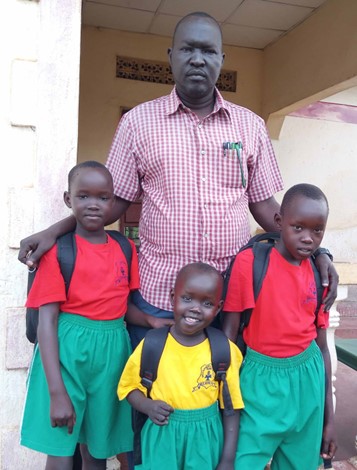 “I have told the glad news of deliverance in the great congregation; behold, I have not restrained my lips, as you know, O Lord,…” (Psalm 40:9-10)
“I have told the glad news of deliverance in the great congregation; behold, I have not restrained my lips, as you know, O Lord,…” (Psalm 40:9-10)
I am Rev. William Jada Daniel Loro, the current moderator of Equatoria Presbytery in the Presbyterian Church of South Sudan.
I have been treated for the Hepatitis B virus since 2015. According to the doctor who first prescribed the medication in Egypt, I should have regular checkups at least every 6-12 months to monitor the effectiveness of the medication and to do an abdominal scan. I was late for my checkup due to financial constraints. By the grace of God, the church where I am serving helped me with money to do the checkup in Khartoum. I left Juba on Saturday, the 8th of April 2023, one day before Easter, reaching Khartoum that evening. On Sunday morning I celebrated Easter in one of the Episcopal churches near where I was staying. The following day I went to the hospital with my friend Michael Angelo Modi. The checkup went well, the doctor commenting about the really good test results. The only test remaining was the viral load, which the Al-Faisal specialized Hospital doesn’t have, so the doctor sent me to the nearby Al-Fidel Hospital. There I was told to return after one week to collect the results. So on Saturday I went to Khartoum city to meet my friend Michael, and to get the results. At 9:00 am I received a call from where I was staying that there were gunshots in the Souba area, where Rapid Support Forces (RSF) have been based. Before the conversation finished I heard gunshots in the military command site not far away. Immediately people begin to run in different directions, especially to bus stations. I and my friend tried to reach our bus station. Unfortunately, since drivers had fled to safety, there were no busses. We wondered what to do then. We ran to Khartoum Christian Center (KCC), a Pentecostal church. KCC was the center we used to worship in before the separation of South Sudan from Sudan in 2011. It is closer to the presidential palace than to the RSF command area. The area was controlled by the RSF, but the Sudanese Armed Forces (SAF) was fighting them. We knocked on the gate, but the gate keeper did not open for us. Near that church there was another hospital. Someone from the hospital saw us stranded at the gate and called us to enter the hospital, because bullets might hit us, as firing was now everywhere.
An unusual kind of RMNI team traveled to Torit and Juba, S. Sudan March 9-23, travel inclusive. With us was Arnold Polk, designer of a unique block-making machine. Lookout Mountain Presbyterian Church funded this unit, and it took over a year for it to arrive on site. It uses only a little cement in each block and no mortar between blocks. Once the footer for the foundation is laid, blocks can be rapidly laid. The walls of a large one-story building can be in place in one-three days, depending upon size. Then blocks are covered inside and out with stucco. Plumbing and electrical lines are placed within the twin holes of each block. More information about this amazing technology is on Arnold's website. Pictured is the first block made at Torit and a small training structure.
Joe Huebscher and I traveled on to Juba to work with the Presbyterian Church of South Sudan for a two-day seminar, while fourteen people were trained on the block machine in Torit. We enjoyed very much the interaction with the audience in Juba. We taught on how local churches can be self-sufficient, and Joe taught on how to start a small business. We also visited churches in Yei and Morobo. We appreciate very much working with Patrick Oting in Torit and with William Jada in Juba.

Our fifth trip to S. Sudan was characterized by unseasonably hot weather. By God's grace we came through it, and were able to complete our assignments. Here's a small example of the block machine's work.
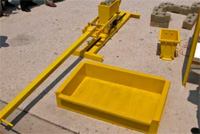 2011 South Sudan Ministry
2011 South Sudan MinistryWe spent time with Ellen Fox, at the Torit hospital and invested time in a budding partnership with the Presbyterian Church of Sudan, headquartered in Juba. The interlocking block machine pictured is due in S. Sudan by year's end. This will enable teams interested in building projects to get involved. We have two church buildings and a prison chapel that we'd like to complete, by God's grace.
This year's S. Sudan Team pushed some limits to assist in church planting in Eastern Equatoria Province, near Torit. Church planters have received training and we were able to assist through outdoor teaching and preaching, as well as through door-to-door evangelism. In the process we had an adventure. The Spirit went before and provided in every situation. The best witnessing opportunities were set up by people who were high on alcohol, for example. We hope to return in 2011, so please ask the Lord if you should be on board next spring. If you'd like to get involved in supporting one of the four church plants, three of which are located where there is no active church at all, please contact us.
This year's Southern Sudan ministry focused upon teaching and evangelism--particularly upon both personal and open-air evangelism. By God's grace 80 made professions of faith in Sudan and Uganda. We had freedom to preach at Torit's city center and to share Christ with shop owners and passers-by. Conditions at Torit improved significantly since 2007.
We also had a wonderful opportunity to help equip church planters and evangelists, and to participate in both house-to-house evangelism and in outdoor preaching at Ntenjeru, Uganda.
The trip went so smoothly that only at the end of the did it become clear why--two churches had prayed for us around-the-clock.
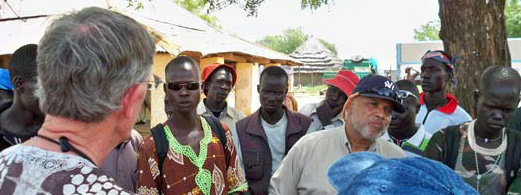

This, our second ministry trip to southern Sudan, was more rigorous than our typical trips to (East) Africa. Southern Sudan is recovering from a civil war that lasted for over 20 years. Our Sudanese coordinator is a graduate of two Bible colleges and longtime friend. He heads the Presbyterian Church of Southern Sudan, under which we serve. We were able to serve those who have been under-served, due to war, for a long time.
We found the city and area around Torit (Eastern Equatoria Province) much as we expected, except that it appears to be burgeoning economically. We were able to present seminars to men in Torit and in Kajjansi, Uganda on church leadership, marriage and personal finances and to women on getting to know God, and to many children about salvation, prayer and African geography. RN David Haley treated almost 590 patients at clinics, mostly young children. We also evangelized, seeing about 27 professions of faith. We plan to post a slide presentation of the trip soon, but in the meantime, check David's journal of the trip.
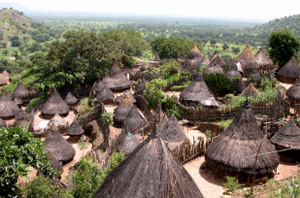
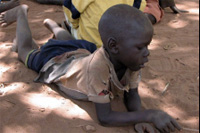
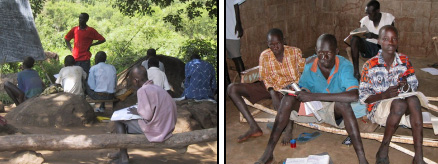
Two impressions arise from our June visit to Lohutok, Eastern Equatorial Province. First is God's common grace imparted to a culture. It would have taxed our founding fathers (and mothers) to have derived such a system of social checks and balances and orderly government. Second is God's provision. He provided safety, good food and our health was disturbed only briefly by various ailments, except for one serious ankle break. A medical evacuation flight landed within 2.5 hours (it's a 1.5 hour flight from the airport base). Then an anonymous donor in America advanced all the funds needed for the hospitalization and medical evacuation flight. The needs of the Lopit tribe are significant. How help can be given without damaging what is godly in the culture is challenging, as it is to any "undeveloped" culture.
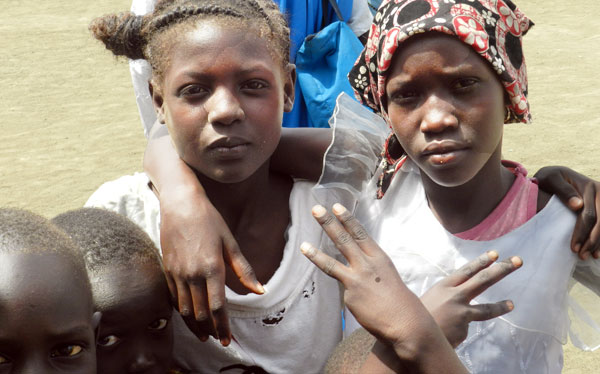
At Malakal in April, 2017, church leaders beseeched us to send doctors to treat trachoma-- rampant in the camp--and which is the leading cause of irreversible blindness globally1. Children are disproportionately afflicted. As the flyer below indicates, we’re recruiting an eye care professional team to go there for 9 days. So far only one other American, an ophthalmologist, is willing to go. The Christian Eye Network has generously posted the need for eye care workers2.
It appears that we’ll have to hire professionals from Ethiopia and perhaps Juba to go to Malakal, which is expensive. With about 30,000 in the camp, we need a large team, particularly if we can also do cataract surgery. We plan to bring hundreds of new Foster Grant reading glasses3.
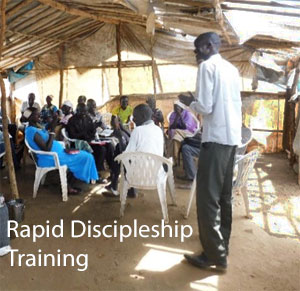 I hope to teach at Malakal, if I’m not needed to assist the eye team, and will provide teaching materials for evangelism and teaching countering cults for use at Grace Theological College in Juba, so that it can be taught without me having to be there. Please pray for a sufficiently large and capable team. Many NGO workers are at the camp, as well as UN personnel, so the risk may seem more than is actual.
I hope to teach at Malakal, if I’m not needed to assist the eye team, and will provide teaching materials for evangelism and teaching countering cults for use at Grace Theological College in Juba, so that it can be taught without me having to be there. Please pray for a sufficiently large and capable team. Many NGO workers are at the camp, as well as UN personnel, so the risk may seem more than is actual.
1http://www.who.int/trachoma/disease/en/
2http://christianeye.net/ministry/featured-items
3Purchased through www.RestoringVision.org. Some will also be distributed at the Westside housing location.
Dear Friends,
By God’s grace, the mobile eye clinic mission was accomplished. The team of 6 eye care professionals had screened over 2000 people and completed 208 cataract and trachoma surgeries. A cataract surgeon and eye nurse stayed behind for 5 days to continue surgeries and to do post-operation exams. We also dispensed many hundreds of pairs of reading glasses in both the UN camps at Juba and at Malakal—for example, over a two day period we gave out 400 glasses.
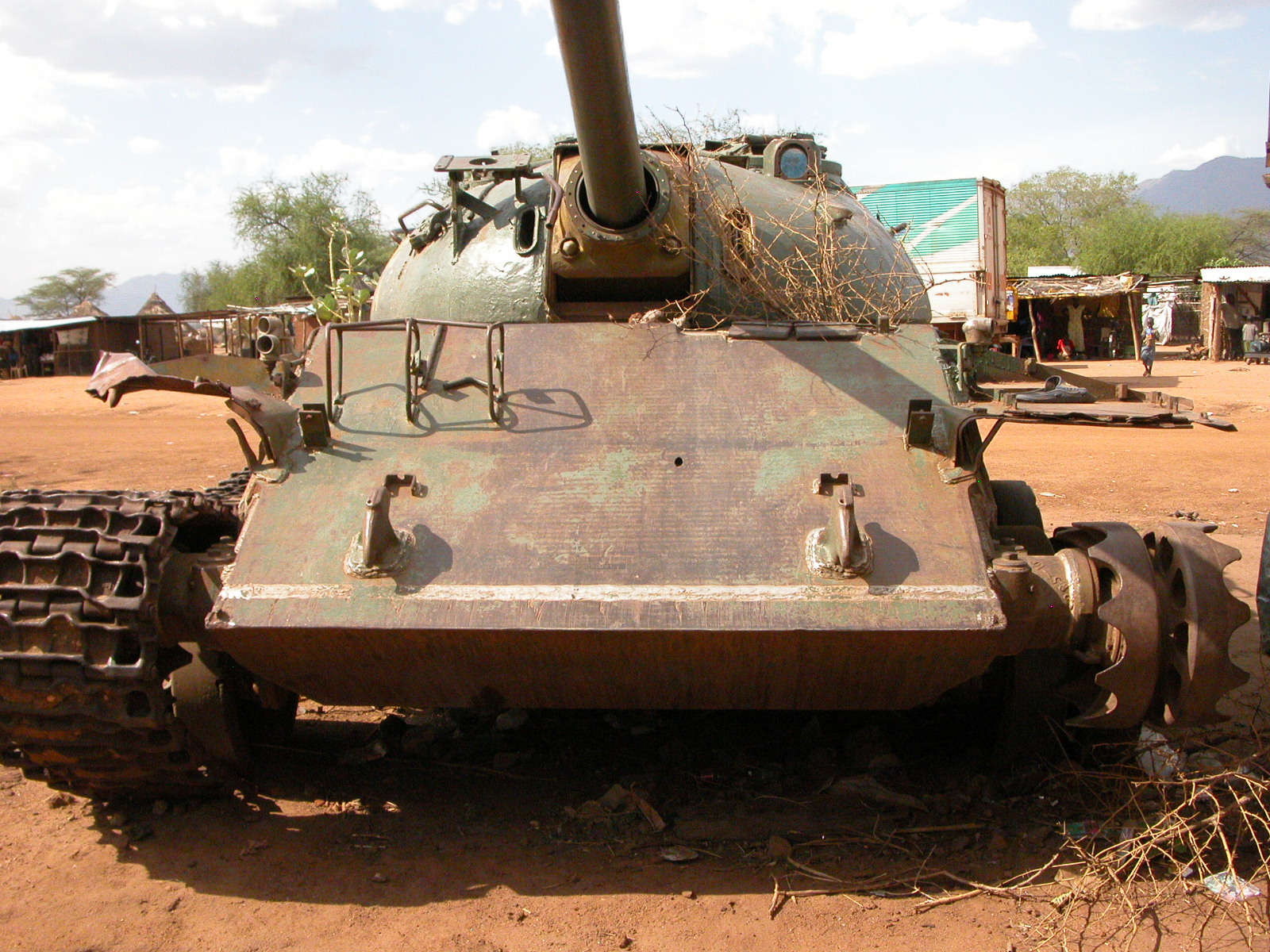
(Since 2010, the South has wisely refurbished this tank.)
Just when it appeared that South Sudan would peacefully emerge as a new nation on July 9, the North Sudan government invaded the disputed Abyei area of South Kordofan State. This area is both fertile and oil-rich. The North's pre-emptive strike was taken when the US has been distracted by the Arab Spring, particularly Libya, and when the UN peace mandate was set to run out on July 9, leaving the better-equipped Sudanese Armed Forces of the North almost unchallenged in their aggression.
The North has stated that it wants all Southern Sudanese to leave the North. Southern sympathisers in South Kordofan state, which is in North Sudan, have recently suffered heavy aerial bombardment and artillery fire to drive these black Sudanese into the Nubia Mountains. Unless the Africa Union or the USA intervene, the North will once again pillage and usurp the resources of South, kill black civilians found in the North and flaunt world opinion. Northern President Bashir is already wanted for war crimes in Darfur, by the Hague. The South is relying upon world opinion to protect them from the T-55 tanks of the North, not willing to be enticed into a new civil war, undoing the due process they have followed toward nationhood since 2005's Comprehensive Peace Agreement.
The North seems to be restrained only by what it is either rewarded to do or forced to do with regard to Darfur and South Sudan. Its commitments are otherwise unreliable.
Please pray for justice, peace and equitable sharing of oil resources by the North and South, and for military intervention against the North, if all else fails, as advocated by former US Envoy to Sudan, Roger Winter. Below are links to articles on this unfolding crisis, beginning May 22, 2011.
The Sudanese Armed Forces (SAF--Northern army) take Abyei town , May 22, 2011.
The SAF and the Sudanese People's Liberation Army (SPLA--Southern army) fight in South Kordofan, (source: Reuters - June 7, 2011)
"Ethnic cleansing" of the Nuba tribe by North Sudan from South Kordofan, June 11, 2011
"Agreement" at Addis Abbaba to withdraw troops from Abyei, June 14, 2011
The Deputy President of South Sudan calls upon the UN to intervene, June 15, 2011
Statement of President Obama on the situation, June 15, 2011
Insightful expert comments in addition to President Obama's, June 15, 2011
The Nuba aggression displaced 60,000 people, June 16, 2011
Former US Envoy to Sudan, Roger Winter, calls for military intervention against the North, June 16, 2011.
Ceasefire announced in South Kordofan, June 16, 2011.
The UN authorized 4,200 Ethiopian peacekeepers to protect Abyei, June 27, 2011
North-South Buffer Zone established, together with talks to resolve outstanding issues, June 28, 2011
The Satellite Sentinel Project tracks movements of the North's military and its actions. It clearly documents Northern aggression.